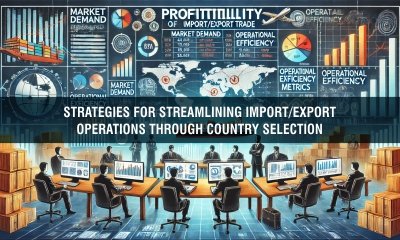Choosing the right countries for import/export operations can greatly enhance efficiency and profitability. Strategic country selection ensures smoother logistics, compliance, and market access. This blog explores effective strategies for optimizing your import/export operations by making informed decisions on where to source or sell products.
1. Analyzing Trade Agreements and Policies Understanding trade agreements and policies between countries is essential for reducing tariffs and ensuring smoother transactions. Countries with favorable free trade agreements can help businesses cut costs and avoid unnecessary regulatory hurdles. Researching these agreements ensures that businesses can capitalize on preferential trade terms for more profitable operations.
2. Evaluating Market Demand and Trends Selecting countries with high demand for your products increases the chances of success in your import/export operations. Conduct market research to identify trends and consumer preferences in different regions. Countries with rising economic activity or expanding middle classes often present lucrative opportunities for international trade.
3. Considering Infrastructure and Logistics The efficiency of a country’s infrastructure is crucial in determining the ease of shipping goods. Countries with developed ports, airports, and transportation networks offer quicker and more cost-effective logistics. Assessing logistical capabilities helps ensure timely delivery, reduces transportation costs, and avoids delays in the supply chain.
4. Assessing Economic Stability Economic stability is a key factor in minimizing risks associated with international trade. Countries with stable currencies, low inflation, and consistent economic growth provide a reliable environment for conducting business. Evaluating the economic outlook of potential countries ensures long-term security and profitability for your import/export activities.
5. Understanding Regulatory Compliance Regulations can vary widely from country to country, affecting everything from product standards to customs procedures. Understanding the regulatory environment in potential countries helps ensure compliance with local laws and international standards. This reduces the risk of fines, delays, and other complications in the import/export process.
In conclusion, Streamlining import/export operations begins with thoughtful country selection based on trade agreements, market demand, and infrastructure. Evaluating a country’s economic stability, regulatory environment, and logistics capabilities is essential for optimizing operations. By focusing on these key factors, businesses can ensure smoother international transactions. In the long run, strategic country selection leads to more efficient, profitable, and sustainable global trade.
1. Analyzing Trade Agreements and Policies Understanding trade agreements and policies between countries is essential for reducing tariffs and ensuring smoother transactions. Countries with favorable free trade agreements can help businesses cut costs and avoid unnecessary regulatory hurdles. Researching these agreements ensures that businesses can capitalize on preferential trade terms for more profitable operations.
2. Evaluating Market Demand and Trends Selecting countries with high demand for your products increases the chances of success in your import/export operations. Conduct market research to identify trends and consumer preferences in different regions. Countries with rising economic activity or expanding middle classes often present lucrative opportunities for international trade.
3. Considering Infrastructure and Logistics The efficiency of a country’s infrastructure is crucial in determining the ease of shipping goods. Countries with developed ports, airports, and transportation networks offer quicker and more cost-effective logistics. Assessing logistical capabilities helps ensure timely delivery, reduces transportation costs, and avoids delays in the supply chain.
4. Assessing Economic Stability Economic stability is a key factor in minimizing risks associated with international trade. Countries with stable currencies, low inflation, and consistent economic growth provide a reliable environment for conducting business. Evaluating the economic outlook of potential countries ensures long-term security and profitability for your import/export activities.
5. Understanding Regulatory Compliance Regulations can vary widely from country to country, affecting everything from product standards to customs procedures. Understanding the regulatory environment in potential countries helps ensure compliance with local laws and international standards. This reduces the risk of fines, delays, and other complications in the import/export process.
In conclusion, Streamlining import/export operations begins with thoughtful country selection based on trade agreements, market demand, and infrastructure. Evaluating a country’s economic stability, regulatory environment, and logistics capabilities is essential for optimizing operations. By focusing on these key factors, businesses can ensure smoother international transactions. In the long run, strategic country selection leads to more efficient, profitable, and sustainable global trade.


